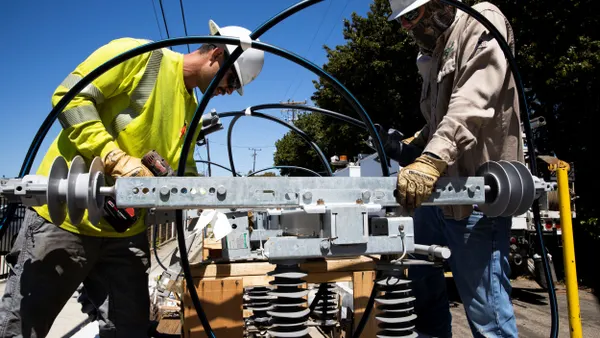Dive Brief:
- The Portland City Council this week voted unanimously to adopt the 2017 Electric Vehicle Strategy, a plan to cut carbon emissions from the metro area's transportation system and make private vehicle use considerably less common.
- The plan includes electric bicycles and scooters alongside busses, vans and privately-owned automobiles.
- Portland seeks to accelerate the transition to zero-emissions vehicles over the next four years, and will help the city cut carbon emissions by 80% by 2050.
Dive Insight:
Just about the last thing the Portland City Council wants residents to do is drive a car. The city this week approved an ambitious plan to help develop its emissions-free transportation options, and wants to see the number of people commuting to work alone drop by about two thirds.
“We are committed to making it easier for Portland residents to take transit, walk, or bicycle,” Portland Mayor Charlie Hales said in a statement. “But there are times when people need to drive, and we want it to be convenient and affordable to drive electric vehicles. EVs improve air quality, reduce carbon emissions, and get us off of dirty and unsafe fossil fuels.”
The city has a Climate Action Plan that aims to decrease Portland’s carbon emissions 25% below 1990 levels by 2020, 40% by 2030 and 80% by 2050. To reach those goals, officials want to shift the "commute mode split" towards walking, bicycling and public transit, and away from single occupancy vehicles. Those will need to decrease from 59% to 20% by 2030, the city estimates.
Past 2030, vehicles still on the road need to be increasingly emissions-free: the city estimates 10% to 15% of all noncommercial vehicle miles traveled on Portland’s roads in 2030 will need to be in electric vehicles to achieve Portland’s broader carbon emission goals.
"This translates into an estimated 50,000 electric vehicles in the metro area, based on average per capita vehicle miles traveled," according to the strategy.
The plan calls for reducing barriers and improving access to zero emissions vehicles, particularly for many low-income people and communities of color, and includes an electric car-sharing pilot project alongside policy options to require new buildings, especially apartments and condominiums, to be built with cost effective charging infrastructure. The city will also support research into new technologies, consider financial incentives for electric vehicle purchases, and research financing options for individuals with poor credit scores.














